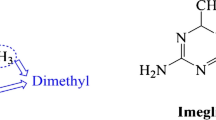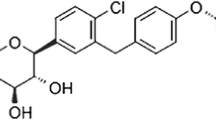Abstract
Imeglimin is the first of the “glimins,” a new class of drugs developed for the treatment of type 2 diabetes mellitus (T2DM). This review highlights its mechanism of action and its context in the field of T2DM treatment. Preclinical data in multiple rodent models have detailed significant effects on mitochondria, particularly improved mitochondrial bioenergetics. This includes changes favoring complex II and complex III metabolism, a mechanism potentially promoting increased fatty acid oxidation, leading to the decrease in hepatic lipid accumulation observed in these mice. Imeglimin was also shown to increase muscle glucose uptake and decrease hepatic glucose production, both in vitro and in vivo. Though studies have also shown imeglimin to significantly improve insulin secretion and decrease β-cell death, whether its physiologic effects are purely insulin dependent remains unclear. Early preclinical studies have shown evidence for improvements in cardiac and renal function in rats with metabolic syndrome, effects not conferred by most currently available T2DM drugs. Clinical studies of imeglimin in humans have shown increased insulin secretion, along with decreased fasting plasma glucose and glycated hemoglobin. Its observed efficacy was comparable to that of currently available agents metformin and sitagliptin and was increased when given in combination with either agent. When considered alongside its benign safety profile reported in patients with chronic kidney disease, imeglimin shows true promise to provide a novel mechanism for T2DM treatment, with potential application in a larger, more comprehensive patient population.


Similar content being viewed by others
References
International Diabetes Federation. Diabetes facts and figures. https://www.idf.org/aboutdiabetes/what-is-diabetes/facts-figures.html
Vial G, Chauvin MA, Bendridi N, et al. Imeglimin normalizes glucose tolerance and insulin sensitivity and improves mitochondrial function in liver of a high-fat, high-sucrose diet mice model. Diabetes. 2015;64(6):2254–64.
Detaille D, Vial G, Borel AL, et al. Imeglimin prevents human endothelial cell death by inhibiting mitochondrial permeability transition without inhibiting mitochondrial respiration. Cell Death Discov. 2016;2:15072.
Fakharnia F, Khodagholi F, Dargahi L, Ahmadiani A. Prevention of cyclophilin D-mediated mPTP opening using cyclosporine-A alleviates the elevation of necroptosis, autophagy and apoptosis-related markers following global cerebral ischemia-reperfusion. J Mol Neurosci. 2017;61(1):52–60.
Giaime E, Yamaguchi H, Gautier CA, Kitada T, Shen J. Loss of DJ-1 does not affect mitochondrial respiration but increases ROS production and mitochondrial permeability transition pore opening. PLoS ONE. 2012;7(7):e40501.
Fouqueray PL, Leverve X, Fontaine E, Baquié M, Wollheim C, Lebovitz H, Bozec S. Imeglimin—a new oral anti-diabetic that targets the three key defects of type 2 diabetes. J Diabetes Metab. 2011;2(4):126.
Donath MY, Storling J, Berchtold LA, Billestrup N, Mandrup-Poulsen T. Cytokines and beta-cell biology: from concept to clinical translation. Endocr Rev. 2008;29(3):334–50.
Leahy JL, Bonner-Weir S, Weir GC. Beta-cell dysfunction induced by chronic hyperglycemia. Current ideas on mechanism of impaired glucose-induced insulin secretion. Diabetes Care. 1992;15(3):442–55.
Perry RJ, Cardone RL, Petersen MC, Zhang D, Fouqueray P, Hallakou-Bozec S, et al. Imeglimin lowers glucose primarily by amplifying glucose-stimulated insulin secretion in high-fat-fed rodents. Am J Physiol Endocrinol Metab. 2016;311(2):E461–70.
Matsutani D, Sakamoto M, Kayama Y, Takeda N, Horiuchi R, Utsunomiya K. Effect of canagliflozin on left ventricular diastolic function in patients with type 2 diabetes. Cardiovasc Diabetol. 2018;17(1):73.
Kristensen SL, Rorth R, Jhund PS, Docherty KF, Sattar N, Preiss D, et al. Cardiovascular, mortality, and kidney outcomes with GLP-1 receptor agonists in patients with type 2 diabetes: a systematic review and meta-analysis of cardiovascular outcome trials. Lancet Diabetes Endocrinol. 2019;7(10):776–85.
Lachaux M, Soulié M, Hamzaoui M, Bailly A, Nicol L, Rémy-Jouet I, et al. Short-and long-term administration of imeglimin counters cardiorenal dysfunction in a rat model of metabolic syndrome. Endocrinol Diabetes Metab. 2020;3(3):e00128.
Pirags V, Lebovitz H, Fouqueray P. Imeglimin, a novel glimin oral antidiabetic, exhibits a good efficacy and safety profile in type 2 diabetic patients. Diabetes Obes Metab. 2012;14(9):852–8.
Fouqueray P, Pirags V, Inzucchi SE, Bailey CJ, Schernthaner G, Diamant M, et al. The efficacy and safety of imeglimin as add-on therapy in patients with type 2 diabetes inadequately controlled with metformin monotherapy. Diabetes Care. 2013;36(3):565–8.
Fouqueray P, Pirags V, Diamant M, Schernthaner G, Lebovitz HE, Inzucchi SE, et al. The efficacy and safety of imeglimin as add-on therapy in patients with type 2 diabetes inadequately controlled with sitagliptin monotherapy. Diabetes Care. 2014;37(7):1924–30.
Poxel and Sumitomo Dainippon Pharma Announce Positive Top-Line Results for Imeglimin Phase 3 Trial (TIMES 1) in Japan for the Treatment of Type 2 Diabetes. BusinessWire. 2019. https://www.businesswire.com/news/home/20191219005696/en/Poxel-and-Sumitomo-Dainippon-Pharma-Announce-Positive-Topline-Phase-3-Results-from-TIMES-2-Trial-of-Imeglimin-for-the-Treatment-of-Type-2-Diabetes-in-Japan-and-Successful-Completion-of-the-Pivotal-TIMES-Clinical-Development-Program
Poxel Announces Additional Positive Results for Imeglimin Phase 2b Study in Japan for the Treatment of Type 2 Diabetes. BusinessWire. 2017. https://www.businesswire.com/news/home/20170606005758/en/Poxel-Announces-Additional-Positive-Results-Imeglimin-Phase
Pacini G, Mari A, Fouqueray P, Bolze S, Roden M. Imeglimin increases glucose-dependent insulin secretion and improves beta-cell function in patients with type 2 diabetes. Diabetes Obes Metab. 2015;17(6):541–5.
Hahr AJM, Molitch ME. Management of diabetes mellitus in patients with chronic kidney disease. Clin Diabetes Endocrinol. 2015;1:2.
US FDA. FDA Drug Safety Communication: FDA revises warnings regarding use of the diabetes medicine metformin in certain patients with reduced kidney function. 2016. https://www.fda.gov/drugs/drug-safety-and-availability/fda-drug-safety-communication-fda-revises-warnings-regarding-use-diabetes-medicinemetformin-certain
Author information
Authors and Affiliations
Corresponding author
Ethics declarations
Funding
No sources of funding were used to conduct this study or prepare this manuscript.
Conflict of interest
R.J.P. received speaker honoraria from the Japan Diabetes Society in 2018 and 2020 and has received investigator-initiated research support from AstraZeneca to explore the mechanism by which SGLT2 inhibitors may cause ketoacidosis in rodents.
Ethics approval
Not applicable.
Consent to participate
Not applicable.
Consent for publication
Not applicable.
Availability of data and material
Not applicable; no new data or materials were generated for this work.
Code availability
Not applicable.
Author contributions
The manuscript was drafted by CK and edited by CK and RJP. Both authors reviewed and approved the final version.
Rights and permissions
About this article
Cite this article
Konkwo, C., Perry, R.J. Imeglimin: Current Development and Future Potential in Type 2 Diabetes. Drugs 81, 185–190 (2021). https://doi.org/10.1007/s40265-020-01434-5
Published:
Issue Date:
DOI: https://doi.org/10.1007/s40265-020-01434-5




